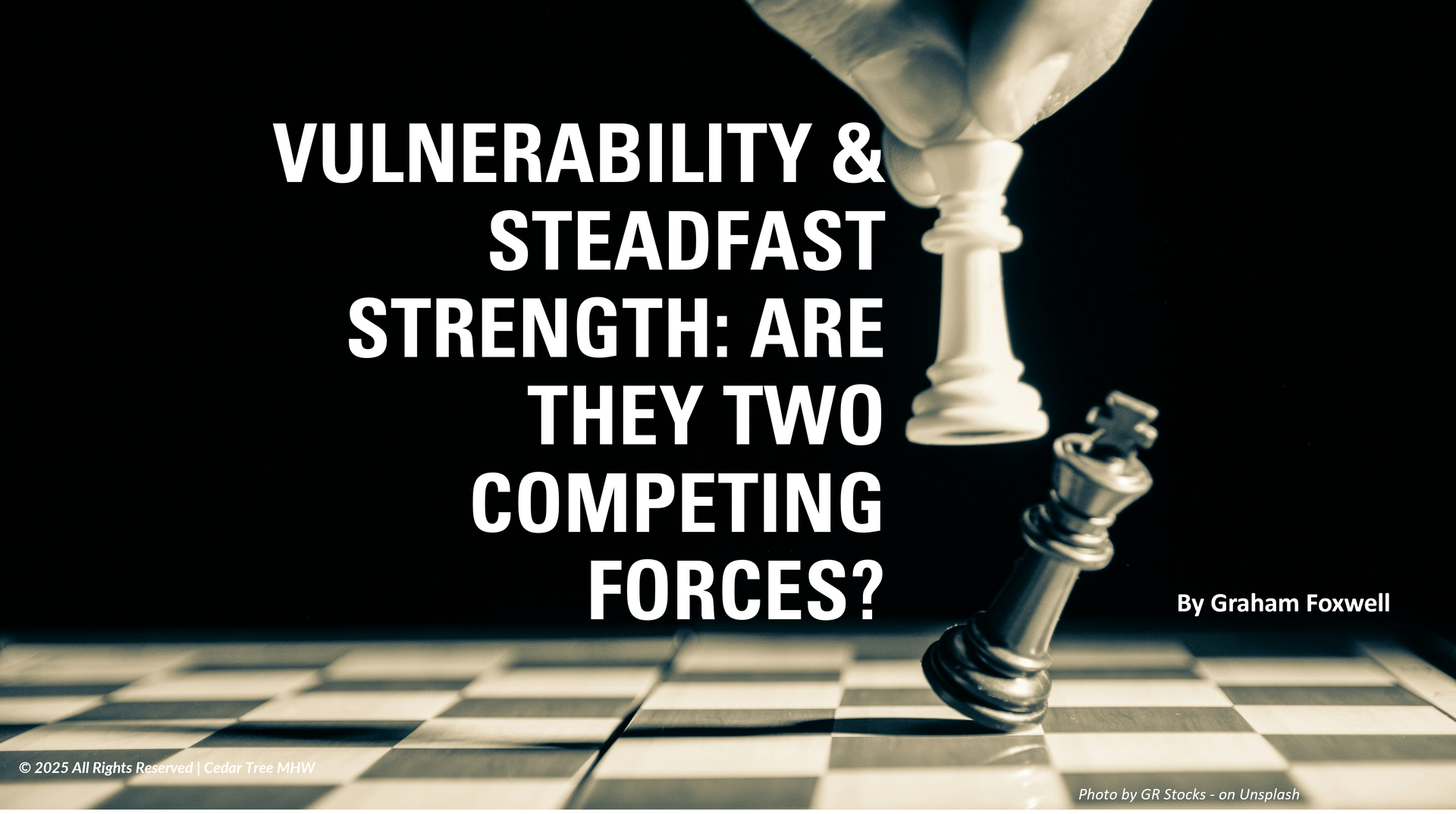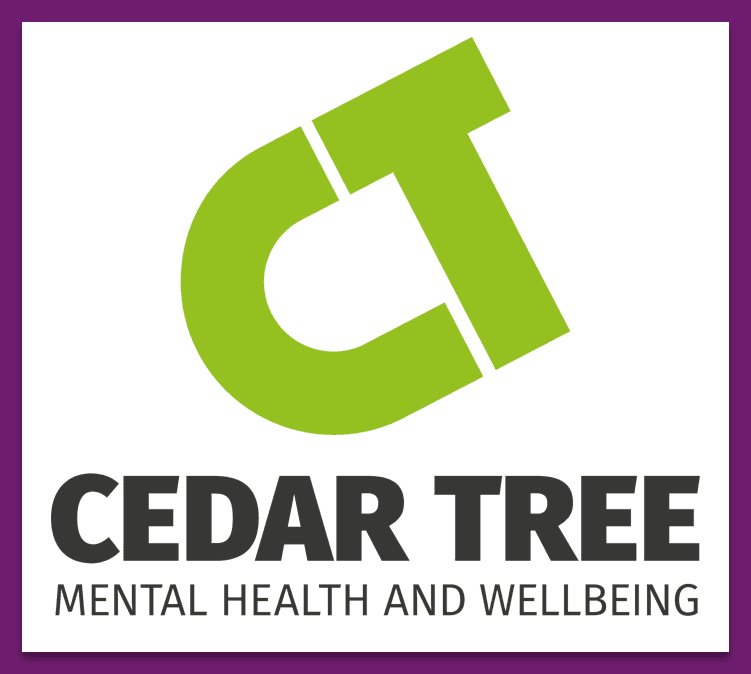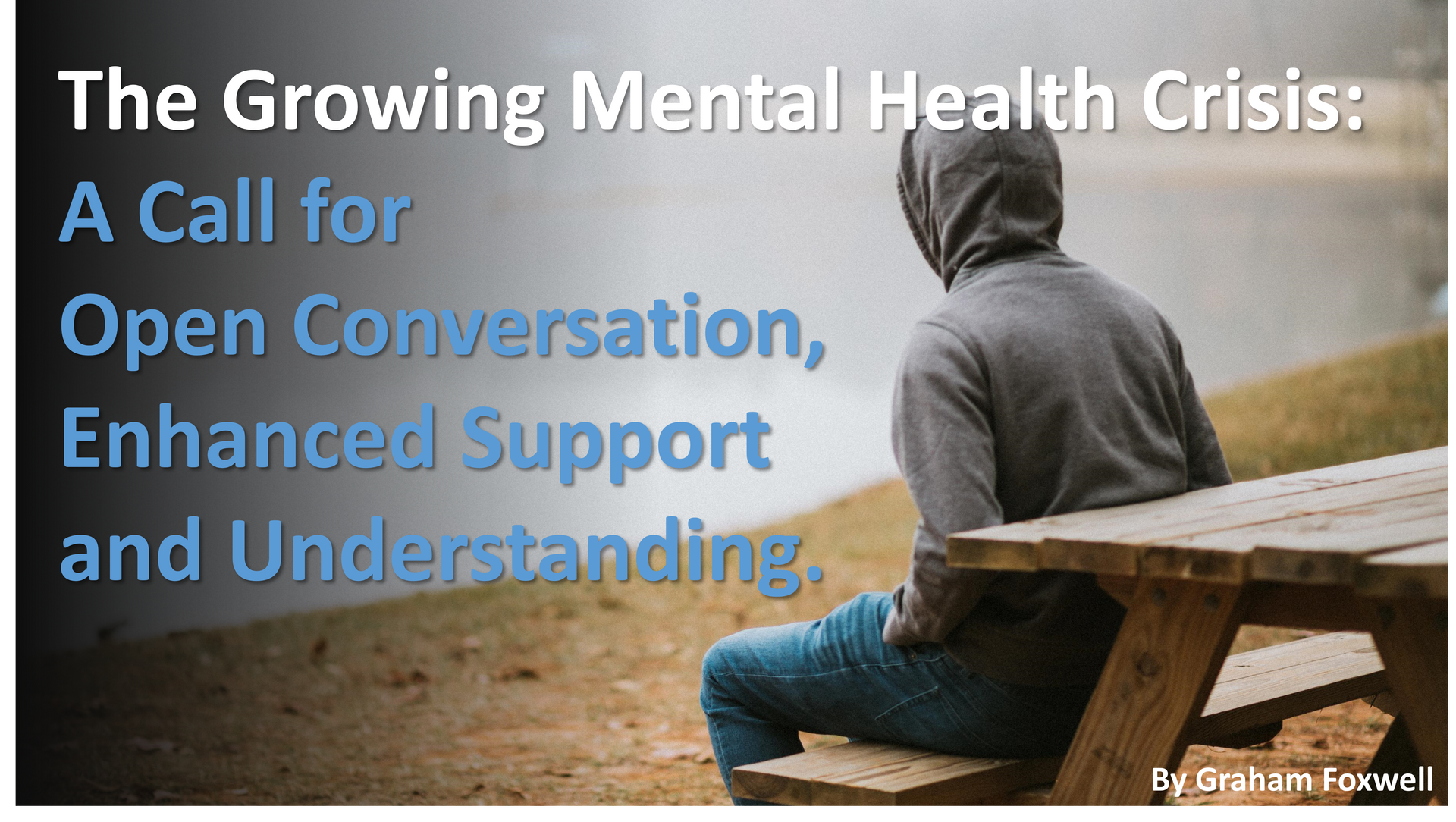Vulnerability & Steadfast Strength: Are They Two Competing Forces?

Welcome, everyone. Today, I want to explore two powerful forces that shape our mental health and ask, “are they mutually exclusive?” I believe the answer is a resounding “no.”
On one hand, we have the courage to be vulnerable and open about our emotions. On the other hand, we have the drive to push ourselves beyond our limits. Society often sends messages that tell us to be stoic and silent— “Be strong and silent”, “Toughen up”, “Don’t show weakness.” These statements can keep us from sharing our struggles—but we know that true strength also comes from openness and the willingness to overcome our challenges.

John's Story: A Journey from Isolation to Connection.
Let me share a story about a close friend—let’s call him John. John's experience is a poignant reminder of the silent battles many face. After losing his job, John felt a profound sense of failure and isolation. The pressure to maintain his composed exterior became overwhelming, and he began to withdraw from social interactions. His nights were plagued by insomnia, and his days were filled with a relentless sense of hopelessness. The once vibrant and confident John now found himself spiralling into a deep depression.
As the weeks turned into months, John's mental health deteriorated further. He started experiencing suicidal thoughts, feeling that his existence was a burden to those around him. The stigma attached to seeking help only intensified his struggle, making him believe that admitting his pain would be seen as a sign of weakness.
It wasn't until we noticed the drastic change in John's behaviour and reached out that things began to shift. With encouragement, John finally opened up about his feelings. This act of vulnerability was a turning point. Friends rallied around him, offering support and understanding. This helped him seek professional help, and slowly, John began to see a glimmer of hope.
John's journey to recovery was not easy, but it was a testament to the power of connection and the importance of breaking the silence around mental health. By sharing his story, John not only reclaimed his strength but also inspired others to seek help and embrace their own vulnerabilities.

A New Understanding of Strength
Recognise that true strength isn't about hiding or bottling up our emotions; it’s about having the courage to be open, honest, and vulnerable. By sharing our inner struggles, we lay the foundation for genuine connections and healing.
The Silent Battle: Overcoming the Stigma of Sharing
For many years, messages like “man up” and “don’t show weakness” have been ingrained in our culture. This can lead to isolation when facing tough times.
The Call to Action: Pushing Past Limits and Cultivating Resilience
While it’s essential to share our feelings, it’s equally vital to find the inner drive to move forward despite adversity. Think of your journey as a two-step process: first, opening up to acknowledge pain, and second, using that honesty to fuel the perseverance needed to overcome challenges.

Angela Duckworth’s research on grit shows us that perseverance—continuously pushing forward despite setbacks—is a critical ingredient for success in life. In her words, grit is what keeps you moving when the path gets steep.
Carol Dweck’s work on having a growth mindset teaches us that challenges are not dead ends but opportunities to learn and adapt. When we see obstacles this way, each barrier becomes a stepping stone on our road to strength.
Understanding When to Push and When to Pause
It's crucial to understand when to push on and strive forward with all your might and when to stop, reflect, be vulnerable, and tend to your wounds. Pushing forward is essential for growth and achievement but knowing when to pause and take care of your mental and emotional well-being is equally important. This balance ensures that you don't burn out and can continue to move forward with renewed strength and clarity.
This balance is mostly achieved through connection with others—seeking support and counsel from friends, family, and sometimes professional help. When we connect with others, we gain different perspectives, emotional support, and practical advice that can help us navigate our challenges more effectively. It's through these connections that we can find the strength to push forward when needed and the wisdom to pause and heal when necessary.
Recognising the signs of when to push and when to pause is a skill that can be developed over time. It involves being in tune with your body and mind, understanding your limits, and being honest with yourself about your needs. When you feel overwhelmed, stressed, or emotionally drained, it might be a signal to take a step back, reflect, and seek support. On the other hand, when you feel motivated, energised, and focused, it might be the right time to push forward and strive towards your goals.
By integrating both pushing forward and pausing into your life, you create a sustainable approach to personal growth and well-being. This approach allows you to achieve your goals while maintaining your mental and emotional health, leading to a more balanced and fulfilling life.

Takeaway
Reflect and Discuss:
- Self-Reflection: Think about a recent time when you felt overwhelmed. What held you back from reaching out to someone?
- Reframing Strength: How might embracing vulnerability be a sign of strength rather than weakness?
- Small Changes for Big Impact: What is one small action you can take today to share your feelings—whether it’s a conversation with a friend, writing in a journal, or joining a support group?
- What challenges do you face in expressing your emotions?
- Can you share a personal experience where opening up led to unexpected support or positive change
- Think about practical strategies to integrate vulnerability into your day-to-day life. Perhaps start a “feelings check-in” with a close friend or relative once a week.

Conclusion:
Our journey towards better mental health is not about choosing between being open and being resilient—it is about weaving these aspects together. By speaking our truths and embracing our emotions, we create the strength needed to overcome any challenge life throws at us.
Thank you for being part of this conversation today. I look forward to hearing your stories and ideas. Let’s move forward together, owning both our vulnerabilities and our unyielding strength.
NOTE: Graham is available to give talks and training on this subject and others. Please get in touch here: https://www.cedartree-mhw.co.uk/guestspeaker-gf
Thank you for reading this.
Please feel free to add your comments and share.
Graham
#MentalHealth #Vulnerability #Strength #Resilience #OvercomingStigma #Connection #PersonalGrowth #Grit #GrowthMindset #EmotionalWellbeing #SupportSystem #HealingJourney #Inspiration #MentalHealthAwareness #Cedartreemhw
(c) 2025 Cedar Tree MHW - https://www.cedartree-mhw.co.uk/










